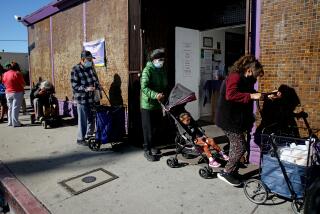Baltimore Program Offers Homeless Families a First Step Toward Self-Sufficiency
- Share via
BALTIMORE — After living on the streets, homeless women and children here get more than a roof when they move into the bright, new apartments created in two run-down, empty schools by a philanthropic couple.
They also get new hope and even a push toward a better life through education and job training.
The first 34 of 70 planned apartments in the old schools opened Thanksgiving week, and the rest are due to open in the spring.
Barbara Boward, one of two full-time counselors at the apartments, said a wide variety of people had applied for the program but all who are accepted have one thing in common: “Their whole face lights up” when they see their new homes.
That’s not just because they are roomy, brightly decorated and well-equipped residences that most middle-class people would find comfortable.
It’s also because they represent a fresh start.
Those accepted into Baltimore’s program enter into 6-month contracts that require them to complete their high school education and then undergo a rigorous schedule of psychological and job counseling, with the ultimate goal of self-sufficiency. The contracts can be extended another six months if sufficient progress is shown. Residents are on their own after the 6-month or yearlong terms, freeing the apartments for other homeless families.
“We’re really interested in getting the family firmly routed on the path to self-sufficiency,” said Marion Pines, until recently commissioner of the city’s Neighborhood Progress Administration.
On any given night in Baltimore, as many as 1,600 mothers and children are homeless, according to Joanne Selinski, director of residential services for the local YWCA. For every family that finds a shelter bed, three or four are turned away, she said.
“It’s very frightening,” Selinski said. “Just think about the little children. The potential impact on children is devastating. It’s heartbreaking, to say the least.”
A U.S. Conference of Mayors study found a 31% increase in the number of homeless families since 1985. And well over two-thirds of homeless families are headed by single parents, according to the Mayors’ report.
Laura DeKoven Waxman of the Conference of Mayors said transitional housing programs similar to Baltimore’s are the ideal solution, “and a lot of cities have tried to do it but there isn’t always the money to do it.”
The money for the project here--$2 million--came a year ago from philanthropists Willard and Lillian Hackerman.
“I worry a lot, and I thought we might put two and two together,” recalled Hackerman, who went to see former Mayor Clarence Burns to see what might be done to help find needy people places to live.
“It’s just a terrible situation. This has been done before, but never by the private sector.”
Hackerman, who owns a construction company, said his biggest worry was for families torn apart by poverty or a spouse’s abuse, citing cases in which battered women are forced to place their children in foster homes or with relatives while they seek temporary shelter.
A survey of 23 U.S. cities by the National Coalition for the Homeless found that New York topped the list with 30,000 to 40,000 homeless family members, followed by Los Angeles with 22,000.
It will cost Baltimore $350,000 a year to run the 70 apartments. Pines said she hopes the private-public partnership here will serve as a prototype for the rest of the nation.
Around-the-clock security and day-care facilities are provided, in addition to the job counseling, but Pines conceded that the program is not a cure-all.
“It’s a symbol that there is a way to a better life,” she said. “We want to get that message across.”
The YWCA’s Selinski agreed that the vision of better days is one of the keys to the program.
“I really think it’s a misnomer, this business about a lack of motivation,” Selinski insisted. “The problem is a lack of opportunity.
“Many of these women have been through really horrendous things. What they need is some vision. That’s what motivation is about, knowing that what you put out today will help tomorrow.”
More to Read
Sign up for Essential California
The most important California stories and recommendations in your inbox every morning.
You may occasionally receive promotional content from the Los Angeles Times.













